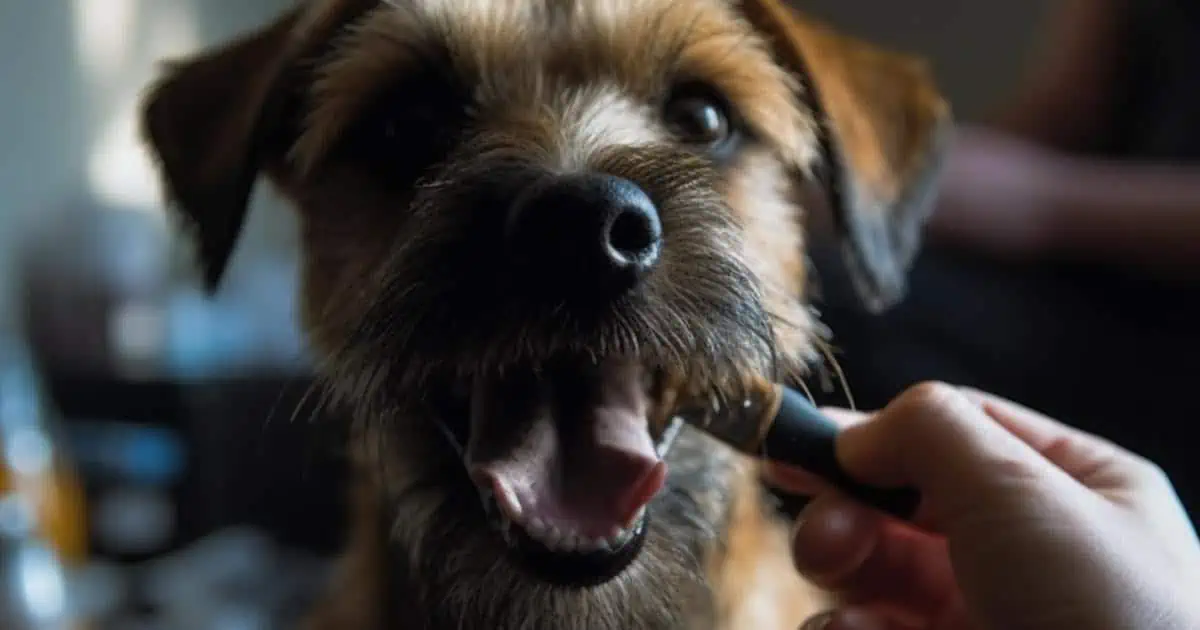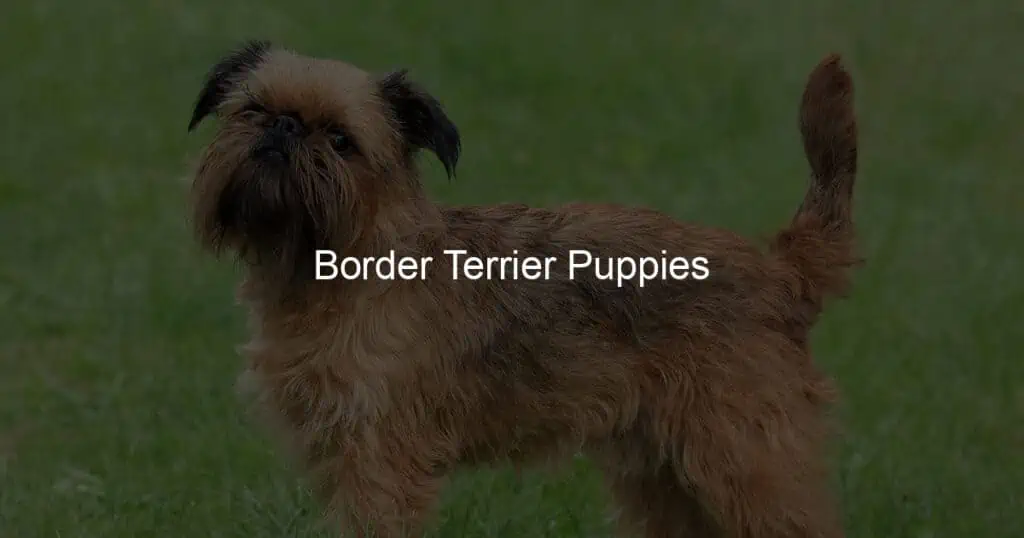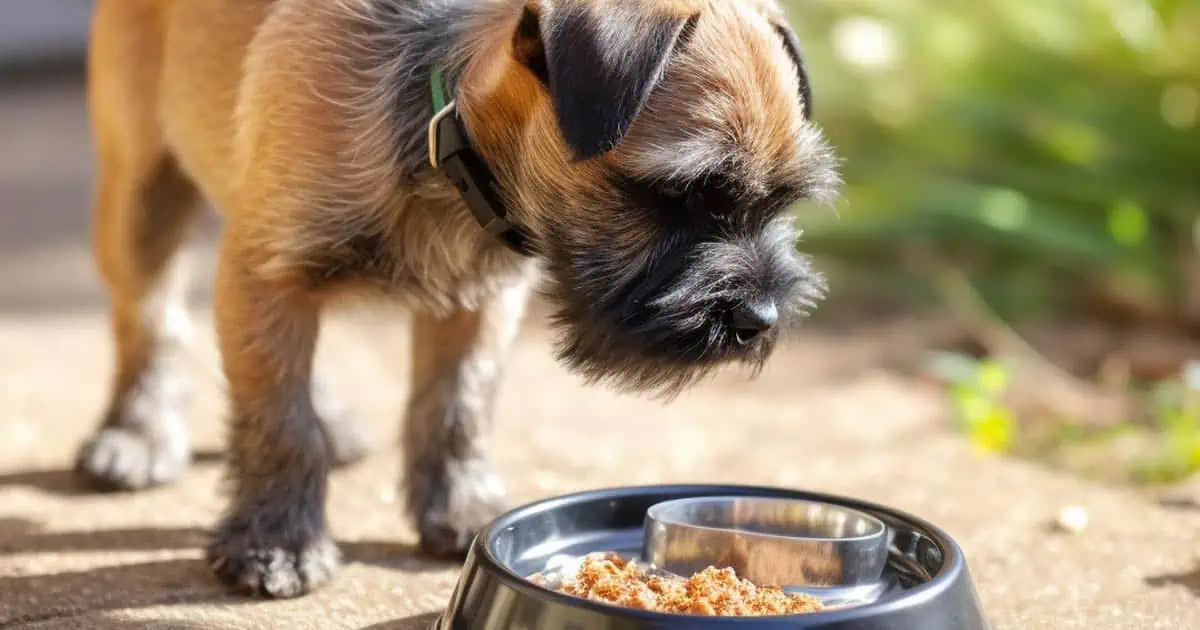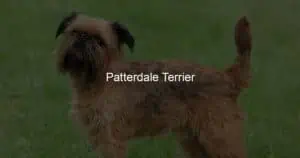What Do I Need To Know Before Getting a Border Terrier Puppy?
A Border Terrier Puppy can be a wonderful addition to any household, bringing joy and companionship for many years. However, it is important to know what you are getting into before taking on the responsibility of adopting one. Here are some things to consider when deciding if a Border Terrier dog is right for your home:
1. Grooming: Their wiry legs and long undercoats require regular grooming in order to keep their iconic look. Depending on how often you plan to groom them, it may be necessary to invest in some grooming tools like an undercoat rake or comb. Additionally, they need their nails trimmed every few weeks and their ears cleaned periodically.
2. Exercise needs: While they don’t need excessive amounts of exercise to stay healthy, Border Terriers are quite active and do need regular activity. Make sure you can provide enough space for them to run around without damaging your property or disturbing neighbors.
ALSO READ: How Much Exercise Does A Border Terrier Puppy Need?
3. Training: Early socialization is especially important for Border Terrier puppies. Introduce them to many different people, animals, and environments as soon as possible in order to avoid issues with shyness or aggression later on. Additionally, basic obedience training will help ensure they remain well-behaved and responsive when out in public spaces.
4. Health concerns: Like any breed, Border Terriers are prone to certain health conditions such as hip dysplasia, eye problems, and thyroid issues. Be sure to research the common ailments associated with the breed and be cognizant of any signs that may indicate a potential issue.
All in all, owning a Border Terrier Puppy can be an incredibly rewarding experience. They are loyal and loving companions who will quickly become members of your family. With some research and preparation, you can ensure that your pup has a long, happy life.

Border Terrier Puppy Food: Fueling Healthy Growth and Development
Providing proper nutrition is essential for the healthy growth and development of Border Terrier puppies. As a responsible pet owner, it’s important to select a high-quality border terrier puppy food specifically formulated to meet their nutritional needs. Look for a puppy food that is labeled as complete and balanced, as it will contain the right balance of proteins, fats, carbohydrates, vitamins, and minerals.
When choosing Border Terrier puppy food, opt for formulas that are specifically designed for small dogs or medium-sized breeds. These formulas often provide the right calorie content to support their growth without overloading them with excess calories. Additionally, consider the ingredients used in the puppy food. High-quality protein sources like chicken, lamb, or fish should be listed as the main ingredient. Avoid foods that contain fillers, artificial additives, or by-products.
It’s important to establish a consistent feeding schedule for your Border Terrier puppy. Divide their daily recommended food portion into several small meals throughout the day to aid in digestion and prevent overeating. Monitor your puppy’s weight and adjust the portion size accordingly to maintain a healthy body condition.
Always ensure that fresh and clean water is available for your Border Terrier puppy at all times. Water is vital for their overall health and helps them stay hydrated.
Remember, each Border Terrier puppy is unique, and their nutritional needs may vary. Consult with your veterinarian for personalized recommendations based on your puppy’s age, size, and specific dietary requirements. By providing them with the right nutrition from the start, you are setting a solid foundation for a healthy and happy Border Terrier companion.
How Much Are Border Terrier Puppies?
Border Terrier puppies can range in price from around $300 to over $1,000 depending on various factors such as the breeder, location, and bloodline. In addition to the cost of purchasing a puppy, you should also factor in additional costs for vet visits, supplies, and grooming tools. Be sure to do your research before making an investment.
Additionally, a reputable breeder will be able to provide important health records for the pup and may even offer a guarantee of health or temperament if something goes wrong. Finding a good breeder is essential when it comes to acquiring a healthy, well-socialized Border Terrier puppy.
With proper care and maintenance, your Border Terrier puppy can live up to 16 years. With that in mind, make sure you’re prepared to commit to a long-term relationship with your new pup before bringing them home!
How To Train Border Terrier Puppy?
Training a Border Terrier puppy can be an incredibly rewarding experience. To ensure that your pup learns good behaviors, you should start early and remain consistent with the training. It’s important to use positive reinforcement methods such as treats and praise whenever your dog does something correctly.
When it comes to obedience training, focus on teaching basic commands such as sit, stay, come, leave it and heel. Once these are mastered, you can move on to more advanced training like agility or tricks. Socialization is also essential for a Border Terrier puppy so make sure they’re exposed to lots of different people and environments from a young age.
Finally, remember that all dogs need discipline. While harsh punishments aren’t recommended, firm and consistent corrections are a must in order to reinforce desired behaviors. With patience, consistency, and positive reinforcement you can train your Border Terrier puppy to become a well-behaved companion.
It’s important that you start training as soon as possible, as early socialization will help keep your pup from exhibiting shy or aggressive behavior later on. Be sure to do your research about the breed in order to give them the best care and training possible! Good luck with your new pup!
How To Stop Border Terrier Puppies Biting?
Border Terrier puppies are known for their energetic and playful personalities, but they can sometimes get a bit too rough during playtime. This can manifest in the form of nipping or biting which is why it’s important to learn how to stop this behavior as early as possible.
The best way to stop your pup from biting is by redirecting their attention with toys or treats. Whenever you notice them getting too mouthy, give them something else to focus on that will satisfy their need for chewing. Additionally, it helps to teach verbal cues like ‘no’ or ‘leave it’ when they start nipping at you or other people.
Reward-based training also works well for discouraging unwanted biting habits in Border Terrier puppies. Whenever they demonstrate good behavior, make sure to give them lots of praise and treat rewards. This will help to reinforce the behavior you want to see from them.
It’s important to be patient with your pup during training as it may take time for them to understand what is expected of them. With patience and consistency, you can teach your Border Terrier puppy not to bite so that they can become a well-behaved companion in no time!
When Do Border Terrier Puppies Calm Down?
Border Terrier puppies are known for their energetic and playful nature, but rest assured, they will calm down as they mature. Generally speaking, most Border Terriers tend to reach their full size by 12 months of age and tend to be less than active dogs by around 18-24 months.
Until then, it’s important to provide plenty of outlets for your pup’s energy such as appropriate toys, exercise, and mental stimulation. This will help ensure that they don’t become bored or destructive in their environment. Additionally, training your pup early can set a great foundation for long-term good behavior while also helping them learn the boundaries around what is acceptable in your home.
With all this in mind, keep in mind that your Border Terrier will calm down eventually and that the energy they have when young can be a great asset as they grow up. Stay patient, be consistent and you’ll soon have a wonderful companion in no time!
By understanding their needs and providing them with plenty of love, regular exercise in, mental stimulation, and training, you can ensure that your Border Terrier puppy will grow into a well-behaved, loyal companion for many years to come. Best of luck with your pup!
How Do I Groom My Border Terrier Puppy?
Grooming your Border Terrier puppy is essential in order to keep them looking and feeling their best. Start by brushing their coat regularly which will help remove any dirt or debris, as well as keep it looking silky and smooth. Additionally, trim their nails when needed in order to prevent them from becoming too long which can cause discomfort.
Finally, make sure that you are cleaning their ears regularly with a damp cloth and check for any signs of infection such as redness or discharge. It’s also important to avoid bathing your pup too often as this may strip the natural oils from their coat which can lead to dry skin.
By providing regular grooming and care for your Border Terrier puppy, you can help ensure that they stay healthy and happy for many years! Best of luck with your next working terrier pup!
Do Border Terrier Puppies Shed?
Border Terriers are considered to be low-shedding, so they usually won’t leave too much hair around your home. However, all dogs shed at least some amount of fur and it’s important to remember that every pup is different. Some may shed more than others depending on their individual genetics and lifestyle.
It’s also important to brush your pup regularly in order to remove any loose fur or debris from their coat which can help reduce the amount of shedding. Additionally, ensure that your pup is getting enough exercise and mental stimulation as this can help keep them healthy and happy which may reduce the amount of shedding over time.
By taking good care of your Border Terrier puppy, you can help ensure that they stay looking and feeling their best! Best of luck with your pup.
When Do Border Terrier Puppies Lose Their Teeth?
Border Terrier puppies typically start to lose their baby teeth between 4-7 months of age and will have their adult set by 8-10 months. It’s normal for your pup to lose some of their teeth in the process, but if you notice any excessive bleeding or discomfort during chewing, then it’s best to take them to the vet.
It’s also important that your pup is getting enough calcium and phosphorous in their diet, as this helps with the growth of strong and healthy teeth. Be sure to speak with a vet about which supplements or foods may be beneficial for your pup’s dental health. Additionally, brushing their teeth regularly can help prevent plaque buildup and other oral health issues.
By taking proper care of your pup’s teeth and providing the dog sports the right nutrition, you can help ensure that they have a healthy set of adult teeth. Best of luck with your pup!
What Are Some Tips for Improving My Border Terrier Puppy’s Dental Health?

Proper dental care is essential in order to help keep your Border Terrier puppy’s teeth healthy and strong. Start by providing the right nutrition which means avoiding any hard food items or treats that may damage or crack their teeth. Soft, kibble-based food formulas are generally best for puppies as these will contain the necessary proteins, fats, carbohydrates, and vitamins for growth and development. Additionally, research which supplements may be beneficial for your pup’s breed in order to give them everything they need.
Brushing your pup’s teeth with a special puppy toothbrush and toothpaste is another great way to help keep their mouth in tip-top shape. You can also introduce dental chews into their diet which will help remove plaque and tartar buildup on their teeth.
Finally, remember to take your pup for regular vet checkups as this will help ensure that any potential issues are caught early before they become serious. With patience and dedication you can give your Border Terrier puppy the best start in life! Good luck with your new pup!
What Should I Feed My Border Terrier Puppy?
When it comes to feeding your Border Terrier puppy, it’s important to provide them with a balanced diet that meets all their nutritional needs. Look for high-quality dog food formulas specifically designed for puppies as these will contain the necessary proteins, fats, carbohydrates, and vitamins for growth and development.
Additionally, research which supplements may be beneficial for your pup’s breed in order to give them everything they need.
It’s also important to remember that puppies have different dietary needs than adults do. Make sure to feed them smaller, more frequent meals as their stomachs aren’t able to digest large amounts of food at once.
Finally, be sure to provide plenty of fresh water for your pup at all times. This will help keep them hydrated and ensure proper digestion of their food. With the right nutrition and care, you can give your Border Terrier puppy a long and happy life! Good luck with your new pup!
What Age Can I Take My Border Terrier Puppy Out in Public?
It’s important to wait until your Border Terrier puppy has been fully vaccinated before exposing them to public spaces where they could potentially come into contact with other unvaccinated animals or people. This typically occurs around 8-10 weeks of age, so it’s best to wait until then or even longer if possible.
Additionally, it’s important to socialize them as early as possible in order to help prevent potential aggression or shyness issues later on. Introduce your pup to lots of different environments and people in a positive way with plenty of treats and praise whenever they do something correctly.
Finally, ensure that your pup receives the necessary training before taking them out in public spaces. Teach basic commands such as sit, stay and come which will help keep them under control when out and about. With some patience and dedication, you can give your Border Terrier puppy the best start in life! Good luck with your pup!
Do Border Terrier Puppies Change Colour?
Border Terrier puppies are born with the same coat color and markings that they will have as adults. However, some may experience gradual changes in their coat color over time due to genetics or environmental factors like sun exposure or diet.
It’s important to keep in mind that these changes aren’t necessarily permanent and may even be partially reversible depending on the cause. If you do notice any unexpected pigment alterations, it’s best to speak with your vet in order to rule out any potential health issues.
All in all, Border Terriers generally maintain the same colour throughout their lifetime. With proper care and nutrition, your pup should stay looking beautiful for many years! Best of luck with your pup!
What Should I Do If My Border Terrier Puppy Not Eating?
If your Border Terrier puppy is not eating, then it’s important to figure out the cause of their lack of appetite. Start by assessing their diet to make sure that they are receiving the necessary nutrition for proper growth and development. If everything looks in order there, then it could be a sign of an underlying health issue such as digestive problems, allergies or even stress.
In this case, it’s best to take your pup to the vet in order to rule out any potential issues. Additionally, there are certain supplements like probiotics or omega-3 fatty acids that may help promote healthy digestion and encourage better appetite in some cases. Be sure to speak with your vet before giving them any medications or supplements.
Finally, ensure that your pup is getting enough exercise and mental stimulation in order to keep them healthy and happy. With patience and dedication, you can help get your pup back on track! Best of luck with your new puppy!
What Nutrition Should I Feed My Border Terrier Puppy?
When it comes to nutrition, it’s important to provide your Border Terrier puppy with the right food formula for their age and size. Generally, puppies should be given a kibble-based diet that is high in protein and low in fat. This will help ensure that they receive all the necessary nutrients for proper growth and development.
Additionally, make sure to avoid any treats or hard food items that may damage or crack their teeth. It’s best to consult with your vet before introducing any supplements into your pup’s diet as the wrong dosage could potentially lead to health issues.
Finally, remember to adjust their feeding schedule as they grow older in order to provide them with the right amount of nutrition for each stage of life. With patience and dedication, you can help give your Border Terrier puppy the best start in life!
Border Terrier Puppies and Cats?
Border Terriers can make great family pets, and they generally do well with other animals in the house. However, it’s important to introduce them to cats slowly and carefully as some pups may instinctively chase or bark at them.
It’s important that your pup is properly socialized and trained so that they understand how to behave around cats. Make sure that all interactions are supervised until you’re confident that your pup will be gentle and respectful towards your cat.
Additionally, provide plenty of toys and treats for both animals in order to keep them entertained and satisfied with each other’s presence.
Finally, remember to take things slow when introducing any new pet into the home. With patience, consistency, and dedication, you can help ensure that your Border Terrier and cat co-exist in harmony. Best of luck!
Border Terrier Puppies Blue and Tan
Border Terriers come in a variety of coat colors and patterns, including classic blue and tan. This striking combination double coat is often considered to be one of the most beautiful coats for this breed and can be quite eye-catching.
The blue coloration generally covers much of the body with tan markings located around the head, legs, ears, and tail. These puppies may also have touches of white on their chest or feet which adds to their unique look.
No matter what color your Border Terrier puppy has, it’s important to provide them with plenty of love and care. With patience, dedication, and proper nutrition you can help ensure that they stay healthy for many years! Best of luck with your pup
What Should I Do If My Border Terrier Puppy Has Diarrhea?
If your Border Terrier puppy has diarrhea, then it’s important to consult with a vet in order to rule out any potential health issues that may be causing the problem. Additionally, it’s important to make sure that they are getting the right nutrition and not eating anything questionable or spoiled food.
You can also try introducing probiotics into their diet which can help promote healthy digestion. Be sure to speak with a vet before giving your pup any supplements as a wrong dosage could worsen the issue.
Finally, ensure that your pup is drinking plenty of fresh water and limit the amount of food they consume until their symptoms improve. With patience and dedication, you can help your pup get back on track in no time! Best of luck with your pup!
Where Can I Find a Reputable Breeder for My Border Terrier Puppy?
When looking for a reputable breeder for your Border Terrier puppy, it’s important to do your research to robust breed them and make sure that they are certified by organizations such as the American Kennel Club or The Kennel Club. Reputable breeders should also be able to provide health clearances from both parents as well as other documentation verifying the quality of their puppies.
Additionally, be sure to visit the kennel or home of the breeder and ask to meet the parents of your pup in order to get a better picture of their health and temperament. If possible, it’s also best to visit the kennel when puppies are present so that you can observe how they interact with each other (and other dogs) as well as the breeder.
By doing your research and taking all the necessary steps, you can help ensure that you find a reputable breeder who provides quality Border Terrier puppies. Good luck with your search!
Conclusion
Border Terriers are a loyal and loving breed that make great family dogs and pets. It’s important to give your pup the best start in life by providing them with proper nutrition, socialization, and training.
Additionally, research which supplements may be beneficial for your pup’s breed as well as find a reputable breeder who is able to provide health clearances from both parents.
Finally, remember to take your pup for regular vet checkups and adjust their feeding schedule as they grow older. With patience and dedication, you can help give your Border Terrier puppy the best quality of life possible! Good luck!

















